#saxophone colossus and more
Explore tagged Tumblr posts
Text

Saturday morning with Sonny Rollins.
23 notes
·
View notes
Note
Got any jazz recommendations for a beginner?
some records that i think make a great introduction to jazz:
kind of blue by miles davis
moanin' by art blakey and the jazz messengers
mingus ah um by charles mingus
big steps by john coltrane
saxophone colossus by sonny rollins
once you get more used to this style and want something more off beat i strongly recommend the shape of jazz to come by ornette coleman
you can also discover more records and artists by looking at who else the musicians in the records you like played with. like when i listened to saxophone colossus i was really impressed by the drumming and looked for more records with max roach, and i discovered a lot of great music like that
jazz is so fun to explore, there are so many subgenres spanning many different decades, you're almost guaranteed to find something you'll love
14 notes
·
View notes
Text

Theodore Walter “Sonny” Rollins (September 7, 1930) leading jazz innovator was born in New York. He was raised by his grandmother who had migrated to the US from the Virgin Islands. He came of age in Harlem in the late 1940s and early 1950s where he was influenced by the remnants of the Harlem Renaissance and the WWII jazz era.
Music was significant in his household. His brother and sister both studied the violin and piano. He adopted the piano as his instrument. As new jazz forms became popular in the early 1940s, he began playing the alto saxophone at the age of 11 and progressed to the tenor saxophone by 1946. His inspiration came from jazz greats Louis Jordan, who played alto saxophone, and Coleman Hawkins, who played tenor saxophone.
He and his musician friends created their band and began experimenting with a new jazz style called bebop. By his 18th birthday, he developed a reputation in Harlem as a leading performer of bebop. In 1949, he made his recording debut with Babs Gonzales. In the same year, he recorded with J.J. Johnson and Bud Powell, the great bebop pianist. In the early 1950s, he worked with Miles Davis, who was a rising trumpet performer. He joined the Clifford Brown-Max Roach Quintet in 1955.
He continued to build his reputation as an innovative artist and an accomplished musician. His most successful album was Saxophone Colossus in 1956. The first album in which he used a trio of saxophones, drums, and double bass was called Way Out West and was released in 1957. He was recognized as the most innovative tenor saxophonist in jazz. In 1965 he wrote the film score for the movie Alfie. Twenty years later, he released his first solo recording, cleverly entitled Solo Album.
After more than a half-century as a jazz performer, he won his first Grammy Award in 2000 for his performance entitled This Is What I Do. In 2004, he won a second Grammy for the composition Without A Song and the Recording Academy’s Lifetime Achievement Award.
He continues to record and perform. #africanhistory365 #africanexcellence
2 notes
·
View notes
Text
Hurray For The Riff Raff Album Review: The Past is Still Alive
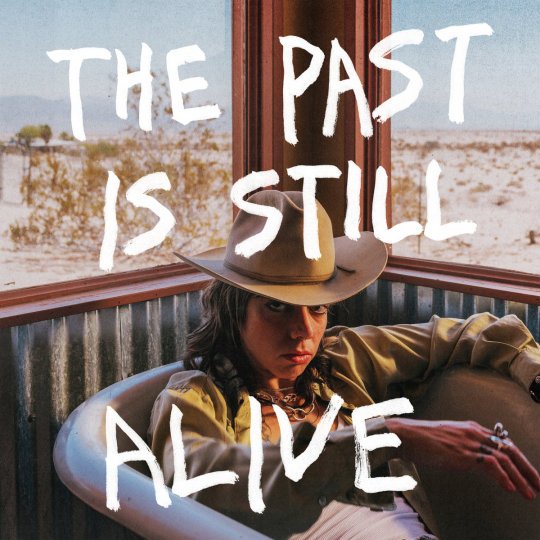
(Nonesuch)
BY JORDAN MAINZER
On The Past is Still Alive, the latest and best studio album from Hurray For The Riff Raff, Alynda Segarra looks back at a specific era of their life to pay tribute to chaos and imagine what could come from it. Their seemingly legendary but very real past is well-known by now: At age 17, Segarra left their home in the Bronx and hopped freight trains, played in a hobo band, and settled in New Orleans, a formative period of simultaneous struggle and freedom. That combined ethos has pervaded all Hurray For The Riff Raff records, but on The Past is Still Alive, Segarra's finally telling the tale, applying what they learned to the present day.
Notably, Segarra started recording The Past is Still Alive a month after their father died; while his voice appears literally on the album's final track "Kiko Forever", his musical uplift acts as a buoy for Segarra throughout the whole thing. Though they had worked with producer Brad Cook and drummer Yan Westerlund prior, Segarra had never recorded with the rest of the album's laundry list of stellar contributors, from Meg Duffy of Hand Habits, and Mike Mogis to guest vocalists Anjimile, Conor Oberst, and S.G. Goodman. That Segarra conquered a period of vulnerability to record the album with bonafide strangers is a terrific feat, but not necessarily surprising: This is a person who has the ability to treat even their fellow band members like the audience, recipients of some remarkable stories full of biography and symbolism alike.
Throughout The Past is Still Alive, Segarra alternates between timeless metaphor and hyper-specific details. On "Buffalo", they remark, simply, that "Some things take time," whether presently forming love or society's death-by-1000-cuts treatment of the oppressed. Segarra sings over strummed acoustic guitar and Mogis' pedal steel, the perfect accompaniment to earned wisdom. "Hawkmoon", on the other hand, is more electric, full of Duffy's bluesy riffing, akin to the epic sound of The Navigator, fitting for a song inspired by a lasting figure: the first trans woman Segarra ever met. As if to project to a stadium full of folks looking to honor Ms. Jonathan, Segarra sings a heartland rock-style salute: "She opened up my mind in the holes of her fishnet tights / Dildo waving on her car antenna and / I could've ridden shotgun forever." Pseudo title track "Snakeplant (The Past Is Still Alive)" juxtaposes both memories of chaos and lessons learned. As Segarra recounts shoplifting and having sex on top of an island of trash, they make sure to tell you what they took from a life among "the barrel of freaks": "Test your drugs / Remember Narcan / There's a war on people, don't you understand?" Duffy's distorted guitar and Matt Douglas's skronking saxophone create beauty from Segarra's warnings of disorder.
Some of the best songs on The Past is Still Alive are incredibly life-affirming. Opener "Alibi" is a plea to drug-addicted childhood friends, a promise that, "Maybe we'll start a band," on a song that introduces the swath of instrumentation present throughout the record, like gentle piano, steady drums, echoing guitar, and pedal steel. "Ogallala" and "Colossus of Roads" prioritize survival in a harsh world--Segarra compares themselves to the musicians still playing on the deck of a sinking Titanic--but not without a wish that the world itself would burn. Westerlund's crashing drums take the former to its logical conclusion, while the latter, inspired by the 2022 Club Q shooting in Colorado springs, makes the case for empathy along the way to the apocalypse. "Wrap you up in the bomb shelter of my feather bed," Segarra sings, fighting cruelty with compassion atop Phil Cook's mournful dobro and organ and Westerlund's funereal drum rolls.
It's a line in "Hourglass" that sticks with me the most among the lyrical and instrumental brilliance of The Past is Still Alive. Recounting feeling out-of-place among the status-obsessed, Segarra shifts their perspective. "Suddenly, a boulder's just sand in an hourglass," they sing. Though they spend much of the album concentrating on time and place, they recognize that our mark on earth is statistically insignificant, something we can use to our advantage rather than something that makes us feel small. What many in society consider important--celebrity, power, money--is volatile compared to the power of your own agency, of giving life to the past.
youtube
#album review#hurray for the riff raff#nonesuch#yan westerlund#anjimile chithambo#matt douglas#the past is still alive#nonesuch records#alynda segarra#brad cook#meg duffy#hand habits#mike mogis#anjimile#conor oberst#s.g. goodman#the navigator#phil cook
3 notes
·
View notes
Text
Milestones - Miles Davis (1958 Review)
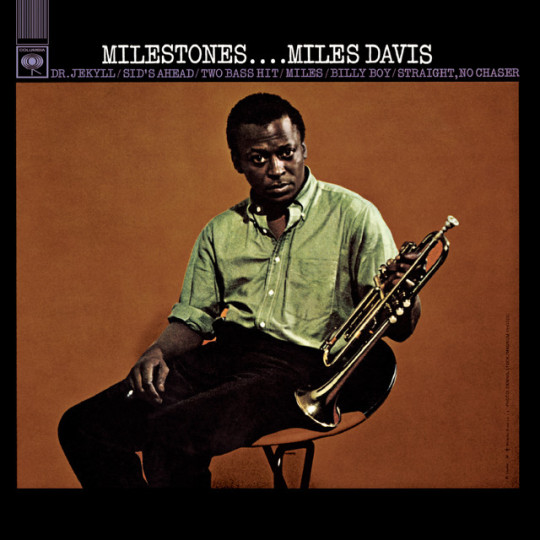
One of the three Miles Davis albums I have heard, we'll get to another one of those albums much later, Milestones was a transitional album for Davis in 1958. It was still showing him in his Bebop and Hard Bop phase, but he was also showing hints of his newfound knowledge of "modal jazz", where you Improvise not over chord changes, but modes. Davis would perfect this album on his seminal album Kind of Blue a year later, but since that's not part of the "10s" Revisited series it's gonna be a while before I review that album. Though the one time I did hear the album back in 2021, it has a really good stereo mix for 1959. Anyways, the album case in point. We start off with the opening track. Dr. Jackle, which I thought was just fairly average fast bebop. A rare moment other than the 1984 New Edition self-titled where I though that the opening track was the weakest on the whole album. But back to the song, all I can say about this song is that the double bass, played by Paul Chambers, sounds like the strings are being bowed rather than fingerpicked when played really fast. Much like on Sonny Rollins' Saxophone Colossus, the second track is a complete contrast from the previous in terms of speed, this case being the song Sid's Ahead. This is the longest song on the album at 13 minutes. Because it's at a slower speed, the improvisation is much more noticeably melodic, and I like how much minimalism the backbeat of the bass and drums are backing the horn solos before the piano, played by Red Garland, joins in during the second half of the song. The speed picks back up with track 3, Two Bass Hits, for some reason I can see the melodic intro and outro of this song somewhat fitting as background music in the scene of an 90s or very early 2000s anime. Unlike Dr. Jackle I actually enjoyed the Improvisation here a lot more, It's not as in your face and all over the place, but there are some melodic elements still there. Not a bad song for the side one closer. Side 2 is the golden run of this album, back to back home runs. It starts off with the albums title track, Milestones(originally called Miles). What I said about the background music in an anime applies here a lot more. This song is also one of the earliest noticeable hints showing Davis's experimentation with Model Jazz that he would later perfect on albums like Kind of Blue a year later. Moving from between G Dorian or A Aoliean. The next song, Billy Boy, is a beautiful sounding song with Red Gardland fronting in the song. Just a piano, bass and drums, no horns. The album closes with Straight No Chaser, another long song at almost 11 minutes long, which is also my favorite "long song" on this album. With each member giving time to improvise in their solos, everyone sounds remarkable. The only other similarity this album has to Saxophone Colossus, is that both albums are exactly 9 out of 10s
Listen to the album here
#music#music review#album review#album#music album#jazz#miles davis#modal jazz#1958#bebop jazz#50s jazz
3 notes
·
View notes
Text
Allow me to introduce myself!
My name is Ian, and I've been here a couple months now, so I probably should have done this sooner, but here's my intro post!
About Me
My name is Ian (what a shocker, I know)
I am 21 years old
I use any pronouns (though I am partial to non-masc ones despite my tragically AMAB nature)
I am a disaster bisexual
I am a dumbass
Some of my favorite things :)
Books
Riordanverse 🔱
The Harry Potter Series (if JKR didn't screw it up so badly with insensitive tropes and being a transphobe) 🪄
The Menagerie Series 🦄
DC Comics (especially Nightwing and Wayne Family Adventures) 🦸🏻♂️
Heartstopper 🏳️🌈
Wikipedia™ rabbit trails 💻
This one specific TLoZ fanfic called Skyward Sword: Saxophone AU 🎷
Music
Hozier 🏞️
AURORA 🌕
Chappell Roan 💃
Beabadoobee 🍂
Olivia Rodrigo 🧛🏽♀️
AJR 🎹
Paramore 🦋
My Chemical Romance 💀
Taylor Swift 🎸
Daisy The Great 🪞
Garfunkel and Oates 👩🏼🤝👩🏻
Twenty One Pilots 👨🏻✈️
Hamilton ⭐
Dear Evan Hansen (questionable handling of mental health issues but goddamn it has a ton of bops) 🪟
Games
DUNGEONS AND DRAGONS FIRST AND FOREMOST 🎲
The Legend of Zelda 🧝🏼♂️
Dust: An Elysian Tail (this game never got enough attention) 🗡️
Pokémon 🐀
Minecraft ⛏️
Mario Kart 🏎️
Movies
Little Women (2019) 👭
Wonder Woman ⚔️
Spider-Man: Into The Spider-Verse 🕸️
The Lego Batman Movie 🦇
The Fault In Our Stars 💔
tick, tick...boom! 🎹
Ponyo 🐟
Avengers: Infinity War 🌌
Captain Marvel 🌟
Megamind 🧠
Onward 🚐
Tangled 💇🏼♀️
Spaceballs 🚀
Honorable mentions:
Rise of the Teenage Mutant Ninja Turtles: The Movie 🐢
The Emperor's New Groove 🦙
The Mitchells vs. the Machines 🤖
Black Panther 🐈⬛
Rogue One: A Star Wars Story 🌑
Guardians of the Galaxy: Vol. 3 🦝
Moana 🌊
(Order not exactly concrete)
Shows
The Owl House 🦉
The Last Of Us 🍄
Gravity Falls 🌲
Gen V 💉
X-Men '97 🎇
The Legend of Vox Machina 🏰
Helluva Boss 😈
Young Justice 🥷🏼
Arcane 🧁
The Boys 🧔🏻
Good Omens 😈
My Adventures With Superman 🦸🏻♂️
Inside Job 🥼
Dead End: Paranormal Park 🎢
Amphibia 🐸
Heartstopper 🌈
Rise of the Teenage Mutant Ninja Turtles 🐢
Parks and Recreation 🏞️
Steven Universe (Future is overhated) ⭐
Avatar: The Last Airbender 💨
Stranger Things 🚵🏻
X-Men: Evolution ❎
I have several more, these are just what my top ones are
Others
Podcasts: The Magnus Archives 👁️📼🕸️, The Adventure Zone (favorite arc: Amnesty) 🪓🌂📕, Welcome To Night Vale 👁️🌵🐈⬛
Animals: Cats, bats, owls, and dogs 🐈🦇🦉🐕
Colors: Purple and sea foam green
Characters: Luz Noceda, Dick Grayson (Nightwing), Ellie Williams, Piotr Rasputin (Colossus), Hunter (TOH), Kamala Khan (Ms Marvel), Wendy Corduroy, Magnus Chase, Raphael Hamato, Link AND Zelda, and Reagan Ridley
Foods: Waffles, tacos, any pasta with alfredo, cheesecake, mint chocolate chip ice cream, and nanimo bars
Activities: Drawing, singing, ukulele/piano, sharing every single piece of my personal information online (as shown above), freaking out over common interests, being silly
Epilogue
I am steadfastly unapologetic for the too much information I have put on here (which goes against my nature as a half-Canadian)
Just kidding. I am so sorry.
Anyways, I hope you had a great time meeting me! I hope I'm cool or something like that :)
#introducing myself#how much is too much#because i am not very good at things#please don't hurt me#if you or a loved one did NOT have a good time meeting me you may be entitled to financial compensation#i am so sorry#why am i apologizing so much#i want food#pinned intro#intro post
14 notes
·
View notes
Text
Sonny Rollins - Saxophone Colossus (LP, Album, RE)
Vinyl(VG++) Sleeve(VG++) Insert(VG++) Obi(VG++) // with Obi 帯つき / more than VG+ conditions, in great shape / コンディション 盤 : Very Good Plus (VG+) コンディション ジャケット : Very Good Plus (VG+) コンディションの表記について [ M > M- > VG+ > VG > G+ > G > F > P ] レーベル : Prestige – LPR-8850 フォーマット : Vinyl, LP, Album, Reissue 生産国 : Japan 発売年 : 1979 Japanese Pressing. with Insert, Obi. ジャンル : Jazz スタイル : Bop 収録曲 : A1. St.…
0 notes
Photo
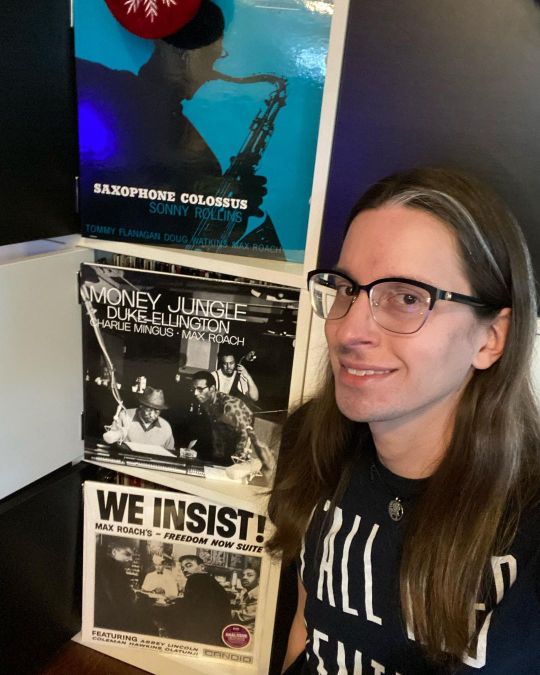
Finishing up this #superfriendssunday 12 Days of Christmas with some more jazz! Because it’s 12 Drummers Drumming, and my favorite drummer is the mighty Max Roach. These are my three go-to Roach albums, all in AAA audiophile reissues: Sonny Rollins’s Saxophone Colossus (Analogue Productions mono), Money Jungle with Duke Ellington and Charles Mingus (Blue Note Tone Poet), and his own We Insist! Freedom Now Suite (Pure Pleasure). #maxroach #sonnyrollins #dukeellington #charlesmingus #jazz #jazzvinyl #vinyl #vinyladay #lp #vinyloftheday #vinyligclub #vinyljunkie #vinylcommunity #vinylcollective #instavinyl #vinylgram #recordcollector #nowspinning https://www.instagram.com/p/CX1e6Ovp70D/?utm_medium=tumblr
#superfriendssunday#maxroach#sonnyrollins#dukeellington#charlesmingus#jazz#jazzvinyl#vinyl#vinyladay#lp#vinyloftheday#vinyligclub#vinyljunkie#vinylcommunity#vinylcollective#instavinyl#vinylgram#recordcollector#nowspinning
2 notes
·
View notes
Text
Derek Taylor 2020: We’re Still Here

That’s about the best that can be said for a year that pulled out nearly every stop in a surging sea change to calamity, adversity and tragedy. The number of people lost to a pandemic that now stands steadfast as a monument to the true meaning of American Exceptionalism as the epitome of empathy-eradicating self-interest is enough to negate even the noblest efforts at laughing to keep from crying. Musicians and music persisted though, even in a severely altered performance landscape of shuttered venues and virtual concerts. And recorded offerings new and archival remained plentiful.
When so much about the present feels like a sprint backwards, societally, environmentally and across multiple other measures, music reliably endures as a means for finding both meaning and footing in the world. What follows are 20 capsule vignettes describing selections from the sea of albums circulated this year that kept me afloat, followed by 25 more in list form that did the same. Thank you for reading and thanks for sticking with us.
Paul Desmond — The Complete 1975 Toronto Recordings (Mosaic)

Given the magnitude of hardship this year’s wrought on living musicians, it may appear a bit perverse to lead this list with a dead one. Even so, this immersive set’s become an old reliable when it comes to achieving aurally-sourced solace. Desmond, the arch and affluent altoist, leaning into a Canadian club residency with ace sidemen while making good on his gentleman’s agreement with absent Dave Brubeck to abstain from piano accompaniment. The leader’s lady-killer instincts are assiduously evident in the amorously-oriented song choices as his dulcet, tranquilizing tone seduces and delights, night after night.
Chris Dingman — Peace (Inner Arts)

An intensely personal project where abundancy of content arose not out of ambition but rather necessity and is made all the more affecting for it. Dingman designed and played the nearly six hours of solo vibraphone music on this set for his hospice-sequestered father with sole purpose of providing comfort and calm. Reflection after his parent’s passing moved him to release it into the world with the hope that it could do the same for others. Intention accomplished.
Joe McPhee — Black Is the Color (Corbett vs. Dempsey)

It’s been a distressing year for nearly everyone, but particularly for McPhee, who lost his brother Charlie to illness. Even amidst ongoing emotional tumult, his fecundity felt undiminished. AC/DC on the British OtoROKU label offers another entry with the English organ trio Decoy. Of Things Beyond Thule, Vol. 2 is a smashing CD sequel to its vinyl predecessor with Dave Rempis, Tomeka Reid, Brandon Lopez and Paal Nilssen-Love comprising the super group. A reissue of the seminal She Knows… with Scandinavian power trio The Thing on the Ezz-thetics label and Black is the Color compiling early concert material in surprisingly sharp fidelity from the Corbett vs. Dempsey imprint cover the archival end of things.
Sonny Rollins — Rollins in Holland (Resonance)

The Saxophone Colossus holding court with Dutch compatriots in 1967. Most conspicuous is daredevil drummer Han Bennink, who even at this early stage straddles swing to European Free Jazz from behind his kit. Rollins shifts between comparatively pithy studio salvos and effusive concert excursions that once again cement his supremacy in the strenuous realm of long form improvisation. Seven decades as a musician makes for a bank vault-sized cache of bootlegs, but this one, refurbished and authorized remains something special.
Stephen Riley — Friday the 13th (Steeplechase)
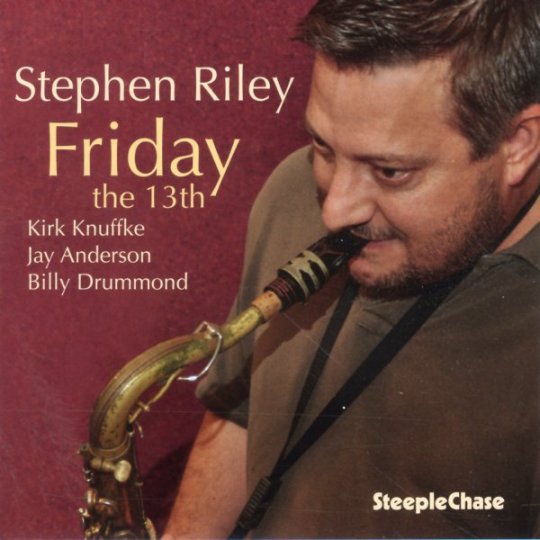
Like McPhee, Riley’s a perennial resident of my pantheon. This date realized a long-standing wish to hear him in the company of cornetist Kirk Knuffke backed by the freeing simplicity of bass and drums. Both men have aerated, instantly recognizable tones and pliancy in phrasing that provides practically endless possibilities in tandem. Riley’s also instrumental as featured guest on Pierre Dørge’s Bluu Afroo, a slightly preemptive Ruby Anniversary celebration of guitarist’s multinational New Jungle Orchestra.
Sam Rivers — Ricochet & Braids (No Business)

The auspicious launch of a Sam Rivers archival series last year was among the Lithuanian No Business label’s greatest achievements. Two more seminal entries came down the pike in 2020: Ricochet featuring Dave Holland and Barry Altschul of particularly fine vintage, and Braids spotlighting another pivotal Rivers ensemble in Hamburg with low brass wizard Joe Daley. There are four more to go, which should target the end of 2022 for the series’ completion.
James Brandon Lewis — Live at Willisau & Molecular (Intakt)

Lewis is the type of compelling artist tapped for accolades like Down Beat’s Rising Star award, despite having been active as an accomplished improviser for over a decade. Delayed exposure is common collateral to a career path in improvised music though, and the saxophonist hasn’t let slow-to-cotton critics slow him down a bit. A deal inked with the Swiss Intakt imprint has so far yielded Live at Willsau, which finds him in fiery duo with Chad Taylor, and Molecular, a studio venture with an all-star quartet that will hopefully become a working band again in 2021.
Susan Alcorn — Pedernal (Relative Pitch)
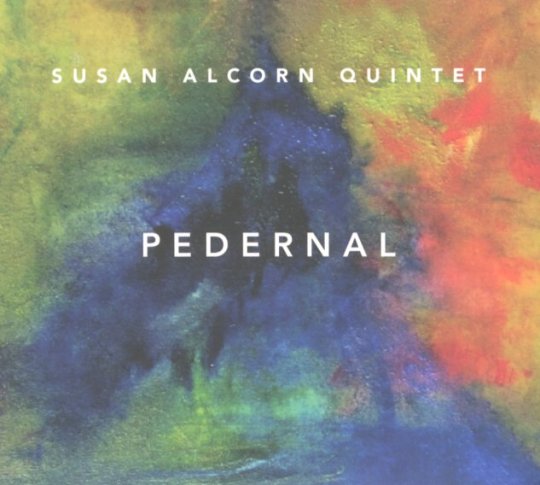
Pedal steel may feel like a nascent voice in improvised music, but in actuality Susan Alcorn and her peers have been plying it as a viable vehicle for some time. While Pedernal is somewhat perplexingly her first album as clear-cut leader, impediments to an earlier debut seem inconsequential given the ample amount of thought and design evident in the end product. Strings wielded by Michael Formanek, Mary Halvorson and Mark Feldman weave with the wide gamut of Alcorn’s aqueous sonorities across intricate pieces further stamped by Ryan Sawyer’s peripatetic drums. The results are at once daring and distinguished.
John Scofield — Swallow Tales (ECM)
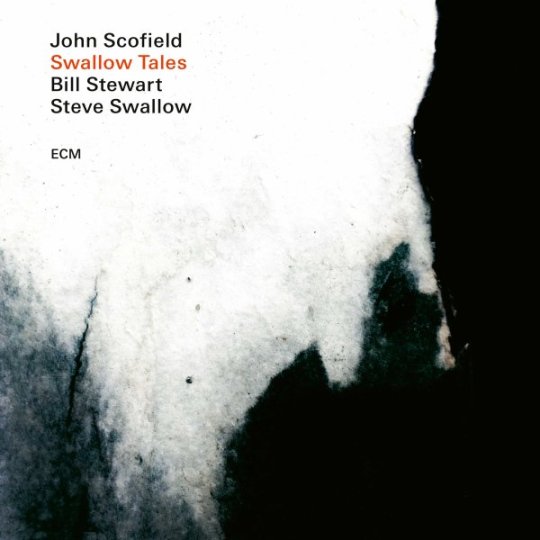
ECM has an enviably accomplished record when it comes to matching the austerity and formality of its sound design to artists’ objectives. Case in point this stark, but not standoffish trio set that’s as much (electric) bassist Steve Swallow’s offspring as it is Scofield’s. Drummer Stewart is the third point in the triangle, but he sagely defers to his elders, leaving them to a dance of differently gauged strings that expertly balances motion and space.
Corbett vs. Dempsey
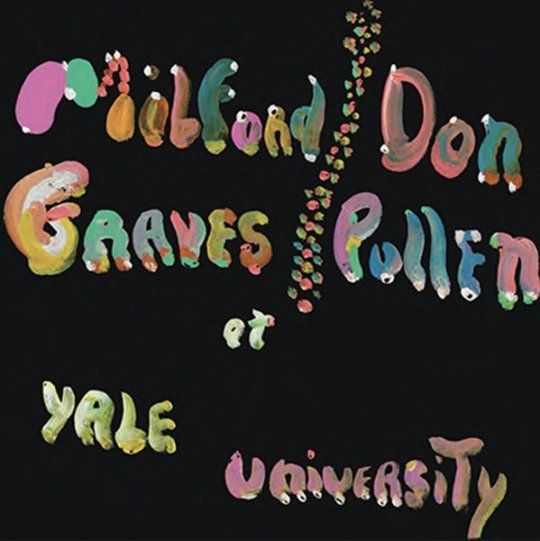
John Corbett is emblematic of that rare breed of music monomaniac who balances obsessiveness with altruistic generosity. He’s personally responsible for bringing dozens of rare and classic recordings back into circulation, first through the fondly remembered Unheard Music Series and more recently via the CvD concern. This year, another stack was added to that sum with Milford Graves & Don Pullen’s The Complete Yale Concert 1966 (including the rarified Nommo), Alexander von Schlippenbach’s Three Nails Left, Tetterettet by the ICP Tentet, Peter Kowald’s self-titled FMP debut as a leader and the madcap New Acoustic Swing Duo from Willem Breuker and Han Bennink as standouts.
Whit Boyd Combo — Party Girls & Dracula (the Dirty Old Man) (Modern Harmonic)

Vintage skin flick soundtracks have rarely if ever received an even-handed shake in terms of relative artistic merits. Tarred with the same smut brush as the visuals they were constructed to accompany, they’re routinely viewed as just as disposable. The Whit Boyd Combo doesn’t exactly dispel this dictum, but it does lay down some funky and at times refreshingly fractious freewheeling horns over organ, bass, and drums driven beats on this late-60s session tape excavated by the folks at Modern Harmonic. The companion Dracula (the Dirty Old Man) isn’t quite on par, but it’s still a solid vessel for competently crafted fossilized grooves.
Robbie Basho — Songs of the Avatars (Tompkins Square)
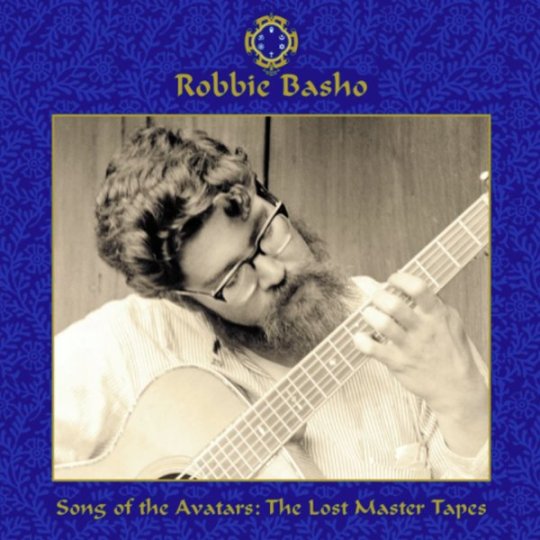
Real Gone Music whet the appetite earlier this year with the release of Songs of the Great Mystery, a “lost session” from Basho’s tenure at the Vanguard label. Songs of the Avatars ups the ante substantially by granting outsider access to a six-hour survey of the dearly departed fingerstyle guitarist’s personal tape trove. The aural riches are ample and include Basho exploring familiar proclivities (Indian, Native American and Japanese interpolations) alongside unexpected new ones (ballet and cantata) with passion and conviction to burn along the way.
Jimi Hendrix — Live in Maui (Experience Hendrix)
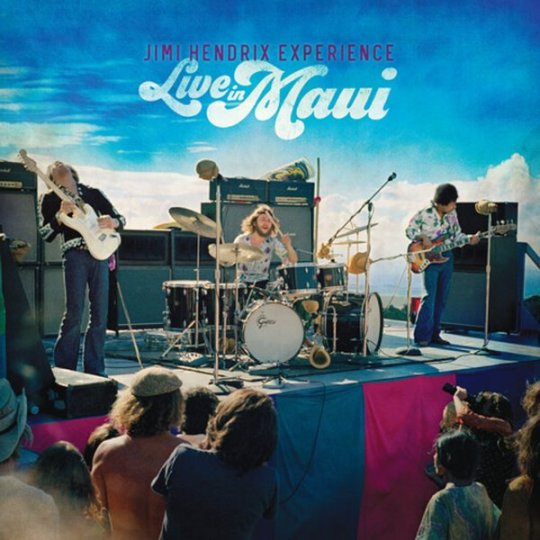
Posthumous Hendrix is a seemingly inexhaustible resource as each year repackaged and repurposed treasures are released into the marketplace. Fortunately, familial heirs are the ones doing the sowing and this lavish set documenting musical and extra-musical particulars of the icon’s reluctant conscription into cosmic hippie scam does right by him. Given the windswept conditions near the Haleakala Crater it’s a minor miracle that he, Billy Cox and Mitch Mitchell mesh as well as they do, and while the footage included can be frustrating in its fragmentary presentation, it’s still a thrill to see and hear them jamming in amiable and ebullient form.
Joe Maneri, Udi Hrant & Friends — The Cleopatra Record (Canary)
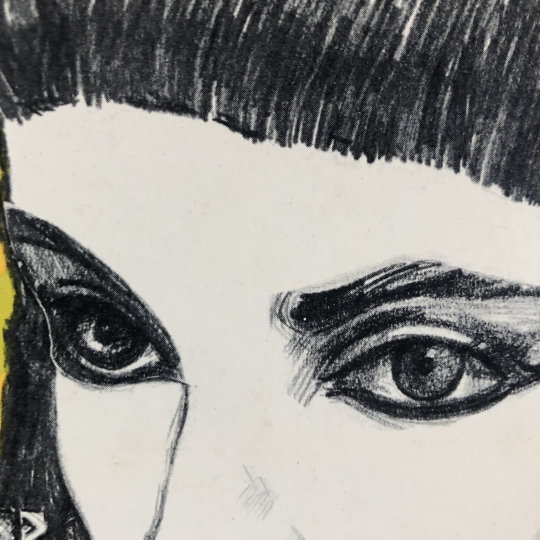
Details on this one could easily serve as grist for a credible short film screenplay with perhaps Jim Jarmusch directing. Brooklyn, 1963: A group of marginalized ethnic musicians relegated to playing wedding gigs gets conscripted for an afternoon recording session. The cheaply packaged and provincially distributed results are destined for the anonymity of dime store cut out bins. Except that the band includes two geniuses: Joe Maneri, who would go on to become a master microtonal improviser/composer and Udi Hrant Kenkulian, one of most revered modern doyens of the Turkish oud. Available over at Bandcamp for a pittance.
Ayalew Mesfin — Good Aderegechegn, Che Belew and Tewedije Limut (Now Again)
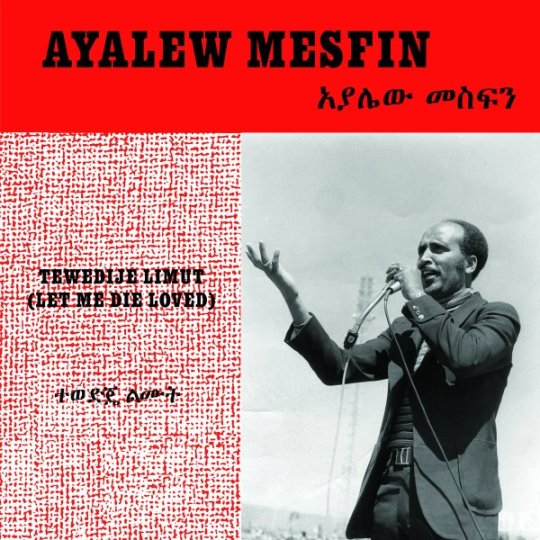
Adding up Buda Musique’s 30-volume Ethiopiques series and a host of other more modest enterprises, it’s obvious that there’s never been more access to vintage Ethiopian music than now. This trilogy of discs from the Now Again label covering vocalist/keyboardist/bandleader Ayalew Mesfin’s catalog restores one of the last untapped reservoirs to circulation. Tight horns, choppy, fuzz and wah-wah drenched guitars and chugging bass fuel dance floor burners while Mesfin’s pipes work memorable magic on a string of melancholic, melismatic ballads.
Kent & Modern Records Blues into the 60s, Vol. 1 & 2 (Ace)

Ace’s appellation as a music label of enviable reach and import has never been an erroneous assignation. This pair of compilations investigates the urban, but far from urbane, blues scene surrounding Los Angeles as documented by the Kent label in the 1960s. Comparatively longer-in-tooth legends like T-Bone Walker and Big Jay McNeely jockey with younger, fame hungry artists like Larry Davis and Little Joe Blue in negotiating a West Coast argot that’s heavy on electricity channeled through guitars and organs. McNeely’s ripping “Blues in G Minor” is one of several snarling sonic wolves in non-descript sheep’s titling.
V/A — A Stranger I May Be: Savoy Gospel 1954-1986 (Honest Jons)
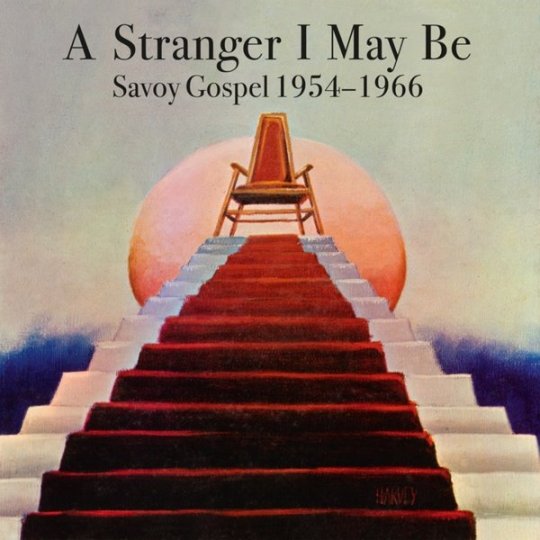
This astutely-sequenced set stands out in the particularly plentiful playing field of this year’s gospel reissues. The mighty Savoy label started out as a jazz venture before branching out into other African American musical idioms. The compilers at Honest Jons parse the program chronologically across three-discs and leave the heavy-lifting of context and artists biography to a lengthy essay. Choirs, ensembles, bands, and moonlighting R&B singers all make appearances directing their talents to devotional and invocational celebrations of the Father, Son and Holy Ghost.
Sun Ra

One of the highlight roundtables at Dusted this year was a Listening Post ruminating on the Sun Ra Arkesta with and sans Ra on the occasion of the band’s new release Swirling. I got to play the (hopefully uncharacteristic) part of curmudgeon in those exchanges principally because while I respect the ensemble’s longevity absent their lodestar leader, there’s still an explicit void extant that tends to eclipse my actual interest. The Ra reissue docket for 2020, which included excellent editions of Celestial Love and A Fireside Chat with Lucifer from Modern Harmonic, When Angels Speak of Love on Cosmic Myth, Heliocentric Worlds, Vols. 1 and 2 from Ezz-thetics, and Strut’s Egypt 1971, which collects Dark Myth Equation Visitation, Nidhamu and Horizon alongside a bevy of contemporaneous unreleased recordings, only bolstered the bias.
Fresh Sound Records

Still the standard for thoughtfully and lavishly curated jazz reissues, Barcelona-based Fresh Sound kept commensurately prolific pace throughout the year. Gary Peacock - The Beginnings surveys the recently deceased bassist’s early work as a versatile California-stationed sideman. Remembering does similar service to rare concert recordings by Belgian guitarist Rene Thomas while The Complete 1961 Milano Sessions offers truth in advertising by compiling woodwind savant Buddy Collette’s sojourn on Italian shores with (mostly) indigenous sidemen.
V/A — Sumer is Icumenin (Grapefruit)
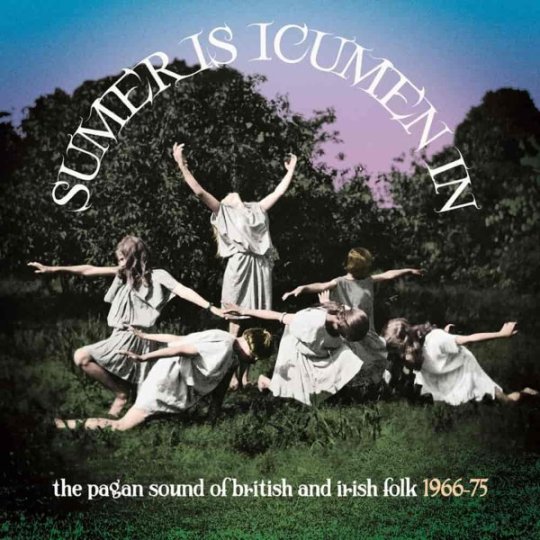
An overdue sequel to Dust on the Nettles (2015), which apparently commands on princely sums on Discogs these days, this set encompasses 4+ hours of cherry-picked vintage British freak folk. Second helpings from stalwarts of the style such as Comus, Steeleye Span and Fairport Convention join Albion offerings from obscurants like Vulcan’s Hammer, Mr. Fox and Oberon in celebrating the weird crossroads of ancient Britannic and 1960s counterculture influences. The cant is more to The Wicker Man side of the spectrum with Magnet’s bucolic canticle “Corn Rigs” the ringer in that regard.
Twenty-five more in mostly stochastic order:
Aruán Ortiz - Inside Rhythmic Falls (Intakt)
Brandon Seabrook/Cooper-Moore/Gerald Cleaver — Exultations (Astral Spirits)
Cecil Taylor & Tony Oxley — Birdland, Neuberg 2011 (Fundacja Sluchaj)
Horace Tapscott w/ the Pan Afrikan Peoples Arkestra — Ancestral Echoes: The Covina Sessions, 1976 (Dark Tree)
Damon Smith — Whatever is Not Stone is Light (Balance Point Acoustics)
Frank Lowe & Rashied Ali — Duo Exchange: Complete Sessions (Survival)
Dudu Pukwana — and the “Spears” (Matsuli Music)
Mary Halvorson’s Code Girl — Artlessly Falling (Firehouse 12)
Burton Greene — Peace Beyond Conflict (Birdwatcher)
Albert Ayler — Trio 1964: Prophecy Revisited (Ezz-thetics)
JD Allen — Toys/Die Dreaming (Savant)
Charles Mingus — At Bremen 1964 and 1975 (Sunnyside)
The Warriors of the Wonderful Sound — Soundpath (Clean Feed)
Kidd Jordan/Joel Futterman/Alvin Fielder — Spirits (Silkheart)
Roland Haynes — 2nd Wave (Black Jazz)
Quin Kirchner — The Shadows and the Light (Astral Spirits)
Thelonious Monk — Palo Alto (Universal/Impulse)
Black Unity Trio — Al-Fatihah (Salaam Records/Gotta Groove)
Gary Smulyan — Our Contrafacts (Steeplechase)
Joni Mitchell — Archives Vol. 1: The Early Years (1963-1967 (Rhino)
Elder Charles Beck — Your Man of Faith (Gospel Friend)
Sarhabil Ahmed — King of Sudanese Jazz (Habibi Funk)
V/A – The Right to Rock: The Mexicano and Chicano Rock ‘n’ Roll Rebellion 1955-1963, Episodio Uno (Bear Family)
V/A – Hillbillies in Hell: Country Music’s Tormented Testament (1952-1974) ~ Revelations (The Omni Recording Corporation)
V/A — The Harry Smith B-Sides (Dust to Digital)
#yearend 2020#Dusted magazine#derek taylor#paul desmond#chris dingman#joe mcphee#sonny rollins#stephen riley#sam rivers#james brandon lewis#susan alcorn#john scofield#corbett vs. dempsey#whit boyd combo#robbie basho#jimi hendrix#joe maneri#udi hrant#ayalew mesfin#kent & modern records#a stranger i may be#sun ra#fresh sounds records#sumer is icumenin
15 notes
·
View notes
Text

#finishedbooks Coltrane: the story of sound by Ben Ratliff. Got this from the library after reading The Jazz Ear that I absolutely loved. Divided into two parts: he examines the evolution of his sound and then in the same order his influence and legacy among musicians and critics that really give great introspection into his evolution. I was afraid the book would be similar to that horrible Chasing Trane documentary where you really learn nothing of his music as it digresses into what people took from his life as if anyone needed to know how Bill Clinton felt about Coltrane's late period proving as pointless as political shows asking Ja Rule for his opinion ...and then the last half hour was even weirder irrelevantly going into how two Japanese collectors felt about him that I am assuming funded part of the documentary. Anyway, with the book here, he can essentially be broken down into three periods (with divisions) beginning with his early period playing under Miles Davis and his first Prestige recordings. Initially under Miles he was rather mediocre and it was known Miles wanted Sonny Rollins but settled with the dark horse Coltrane. It wasn't until around '57/'58 where after beating his heroin addiction (and learned from Monk) he started to develop that saw him outgrowing his spot under Davis by '59 and could be clearly heard in the recordings of the last 1960 European tour brilliantly showing the tension between the two that was always professional. I always liked the rough Prestige recordings which despite the label's name exhibited generally loose quality control standards. If I think about it the only real classics the label ever put out were Rollin's Saxophone Colossus and Dolphy's At the Five Spot but thats why I hold their recordings dear because it is like seeing your favorite artist's sketchpad as they were always great developmental jam sessions. Coltrane really mastered the ballads during this period and blues as well. He put it together in his first masterpiece of the period, Blue Train for Blue Note. His middle period some would put around recording the classic Giant Steps after which Atlantic Records was bought about by Impulse! when he formed what was the classic quartet period. Most would be familiar with My Favorite Things and A Love Supreme but going deeper the great Ellington record and Live at Birdland. Most underrated out of these imo would be Crescent and if you are a real nerd Dear Old Stockholm for the hard bop classics that substituted Elvin Jones for Roy Haynes as the former was in jail on a drug charge. Haynes plays a bit behind the music, a bit more spatial, and fragile and as a result you can hear Tyner better that is a fun listen. The late Coltrane period or really avant garde period was 1965 till his death in 1967 that saw the departure of Tyner and Jones for his new wife Alice and by the end of it featured two drummers tenors etc. I have never really been able to explain what was going on in this music and it is hard to hear but people do appreciate simply feeling it. In all I find that most get into his middle period then more traditional Jazz fans go to the early and rock fans favor the late period. But you can't go wrong with his middle that I view as an ongoing discourse that can be broken down into three parts: the fast style of Chasin' the Trane, soprano sax waltz of My Favorite Things, or modal vamping of Impressions. Kind of stuck from '61-'63 this. Crescent broke him out and fully developed in '64 mixing ballad play with urgency using older tunes and echoed for something rawer. This inevitably culminated in A Love Supreme. One thing I will say about his late period is that there was a sincere earnestness, he truly believed he could incorporate everything and was so open to new ideas. In a way you could see his late period, as transition for what was to come, people at the time didn't even realize how sick he was and how suddenly died.
2 notes
·
View notes
Text
10/9 Joe Sample / Voices in the Rain mca5172 等更新しました。
Buddy De Franco / Plays Benny Goodman mgv2089 Roy Eldridge - Dizzy Gillespie / Trumpet Kings mgc731 John Coltrane / Plays the Blues sd1382 Miles Davis / Miles Ahead cs8633 Howard Roberts / Jaunty Jolly t2716 Junior Mance / Straight Ahead T2218 John Coltrane / Plays As85 Sonny Rollins / Saxophone Colossus and More p24050 Carmen Lundy / Good Morning Kiss bkh523 宮間利之 New Herd / Modern Jazz Highlights sw-7053 宮間利之 New Herd / at Monterey pa3038-39 Miroslav Vitous / Majesty Music al4099 John Abercrombie / Night ECM1272 Pat Metheny / Song X Ghs24096 Eagles / Desperado sd5068 Ray Parker Jr / Two Places At The Same Time al9515 June Pointer / Baby Sister bxl1-4508 Joe Sample / Voices in the Rain mca5172 Ramsey Lewis / Chance Encounter FC38294 Rodney Franklin / In The Center JC35558
~bamboo music~ https://bamboo-music.net [email protected] 530-0028 大阪市北区万歳町3-41 シロノビル104号 06-6363-2700

0 notes
Text
The last album before "The Bridge"
Sonny Rollins. Undeniably one of the most influential tenor saxophone players of all time, but by god was his last album, "Sonny Rollins and the Contemporary Leaders" a train wreck. Unfortunately, nobody else will admit it.
Sonny Rollins is a jazz saxophonist, began his recording career in 1949 at the age of 19. He began in an incredible group lead by the great JJ Johnson, and from there began to take off. He began recording with world class musicians like Charlie Parker, Thelonius Monk, and most importantly, Miles Davis, with whom he recorded his original tunes "Airegin", "Doxy", and "Oleo", which went on to become some of the most well known jazz standards in today's repertoire. His most well known album, "Saxophone Colossus," is almost universally used by every modern jazz saxophonist to develop rhythmic development.
That said, Rollins was far from a perfect musician. Struggling with a mix of drug addictions, and a clear lack of confidence in his playing, at several points in his career he would take multiple years away from public performing. The most well-known of sabbatical resulted in his album "The Bridge", after 3 years where he would practice 14+ hours everyday, at the Williamsburg bridge near Lower Manhattan, so not to disturb others at his apartment. During that time, he did not record or perform publicly. At the end of the 3 years, Rollins said, "I could have probably spent the rest of my life just going up on the bridge. I realized, no, I have to get back into the real world."
But prior to "The Bridge," Rollins recorded an album with a west coast style band, consisting of Hampton Hawes on piano, Barney Kessel on guitar, Leroy Vinnegar on bass, and Shelly Manne on drums. This album, the afore mentioned "Sonny Rollins and the Contemporary Leaders", can really best be defined with one word: Unrefined.
The tracks, while all good tunes, are oddly paired. Using a mix of tunes from popular period music, tunes from plays, and early bebop and swing tunes, it feels more like a mixtape then it does an album. This isn't helped by the odd and inconsistent mixing of the separate tunes, most notably "How High the Moon" which is far more muted and quiet then the other tracks, so much so that its jarring in context. In general, each track sounds like it was mixed by a different person and recorded in a different room.
The playing is also just kind of subpar too. The rhythm section, while all fine musicians, really were not on the same level of Rollins, and could not keep up. The comping of chords feels mundane and band throughout, the time kept in the drum set more often than not feels wobbly, and the energy is low throughout. Rollins playing, while undeniably incredible most of the time, even has moments where its just uncomfortable. Some of the solos have measures of awkward breaks where it feels like a solo ended, no one took over forcing Rollins to keep playing. Some of his solos lack melodic content because he receives almost no support from the rhythm section. One track is even taken so absurdly fast that it teeters on the edge of just falling apart.
Sonny Rollins is an incredibly important musician, but this album really is a lower point in his career. It feels more like a recorded jam session that was then poorly mixed together than anything else.
0 notes
Text
A Swing Through TechWallet CEO Eugene Plotkin’s Jazz Record Collection
Who knew? Plotkin is a real jazz head.
Eugene, when did you start collecting?
I’ve been collecting music in many forms since I was a young child. I started with little cassettes when I was growing up. Everyone got a Walkman so you could have what you want to listen to on hand. Otherwise, you were stuck just waiting for the radio to play that one song you wanted to hear. As a kid I started out with only a couple of tapes, and I heard those songs a million times each. I would buy more each week with my allowance, and then later I got into collecting vinyl records.
What was your very first record?
I moved to the U.S. in the mid-’90s and I was obsessed with American music, so there was a lot to choose from. But truthfully I’ve always been drawn to older styles and performers and specifically jazz. Something about it is nostalgic even if you aren’t from that time and place, but it’s always fresh at the same time. When everyone was listening to Pink Floyd or Eminem, I was looking for rare Billie Holiday albums. I think it was one more way I stood out and started making my own path in the world. But my first record ever? I remember listening over and over to Bill Wither’s Greatest Hits, especially “Ain’t No Sunshine.”
Take us through some of your top picks that should be in everyone’s jazz collection.
I’d have to start with Ellington at Newport. This is a live album from Duke and his band’s performance in Rhode Island that revived his career. It was mostly due to an experimental saxophone solo. Apparently it was so rousing that people started getting up and dancing in the audience. It’s incredible that that one moment sparked so much more amazing music throughout the years. Live jazz recordings capture the energy of the performance much more than studio recordings and place you in that moment in time. Another great live album is Dizzy Gillespie and Charlie Parker’s Town Hall, New York City, June 22, 1945. That’s a fun one.
Here I have more of a classic all-time great, Miles Davis’s Kind of Blue. This album was also kind of experimental. Instead of the popular bebop style he’d been doing, the composition for Kind of Blue was based on modality, so each performer was working inside their own scale. It’s certainly going to be a part of any great jazz collection, and it’s a good place to start for someone getting into jazz history or Davis. Finally, let me show you this Sonny Rollins album, Saxophone Colossus. Maybe I’m a sucker for that big brass sound or stuff that gets you moving. This one is great to have around.
How would you describe your overall taste, and which album is your favorite?
I can never pick one favorite. If I had to, it’s got to be Atomic Mr. Basie from 1958. It was recorded right here in New York City at Capitol Records and won two Grammys that year. I love the more bluesy stuff too, of course, but these tracks are ones that you can really dance to, like “Lil’ Darlin.” It always puts me in a great mood. “April in Paris” from the year before is up there as well. I think I like most of the greats: John Coltrane, Charlie Haden, Clifford Brown, Thelonius Monk.
What makes a good jazz album to you?
For me, it varies from earlier styles to more progressive and experimental, and it can be hard to put my finger exactly on what I like about a song. In general I like energetic jazz, like bebop or hard bop. Of course it’s great to have a fun melody and good lyrics, but I also like an interesting trumpet or sax solo, something that stands out and makes it unique. At the end of the day, I don’t think there are universal rules to what makes jazz good or bad. It’s inventive and varied by nature, and what’s good to someone is going to be a highly personal thing. I would recommend starting with some popular names and see where it takes you.
When and how do you like to listen to music?
Honestly, all the time. I listen to music on my phone while I’m walking the dog or waiting for lunch. I put on records when I have friends over or I’m just relaxing after work. I just got some new headphones for working out, and I’ve been playing a ton of Bud Powell at the gym. I like giving music as a gift as well.
Do you play any music yourself?
No, but I do like to dance. I dance to jazz all the time, sometimes even with my dog. He really likes smoother jazz.
Do you like the music history aspect of living in NYC?
Of course. I love going out to jazz bars in New York like the Roxy and the Village Vanguard on a Friday or Saturday night, whether it's with clients or friends. There’s history on almost every corner here and it’s exciting to be in the same places some of these great songs were played. And there are great contemporary artists playing every day. NYC is certainly still an amazing music city.
Technology plays a huge role in your professional life. How has technology changed music and how you listen to music?
Technology has changed how I listen to music a lot, especially since my cassette days. Even though records have that authentic quality, I definitely do listen to music on my phone now too. Having it right there all the time is great because you can listen to your favorite songs anytime, anyplace, to fit your mood. It’s the same with lots of other things. Technology provides revolutionary ways to make things more accessible and easier to navigate. More people are having an easier time getting interested in new things, whether it be jazz or personal finance. I hope that we can continue to innovate and create more opportunities for learning, as well as giving people more autonomy and choice. Good tech puts what you’re looking for right at your fingertips so you can make your own informed choices. Some people like cool jazz; some like swing. Financial technology helps people understand personal finance, so they can go on to make the best decision for them.
____________
Eugene Plotkin is a Russian-born, Harvard-educated finance, business, and technology professional. Plotkin started as a Wall Street investment banker at Goldman Sachs. During his time at Melvin Capital, he realized his passion for new financial technologies. Today, Eugene Plotkin is the CEO and founder of TechWallet, a fintech company in NYC. Eugene Plotkin has a special passion for helping as many people use technology to understand and organize their finances as possible. He believes technology should directly benefit its users and that fintech has the potential for exponential benefits.
1 note
·
View note
Link
September 7, 1930 -- Walter Theodore "Sonny" Rollins arrived on-planet this day. Widely recognized as one of the most important and influential jazz musicians of his, and any, day, the Saxophone Colossus has recorded more than sixty albums as a leader during a 70-year career.

0 notes
Audio
no love for ned on wlur – october 4th, 2019 from 8-10pm
artist // track // album // label lachlan denton // a brother // a brother // bobo integral deadbeat beat // return // how far // crystal palace good morning // garden // basketball breakups // our golden friend shantih shantih // gravity // someone, anyone? // wild honey * fhedolts // herating // the great complotto compilation // spittle patti // rubber // good big // (self-released) gauche // body count // split 7" w/ joyero // merge judy and the jerks // buford // bone spure cassette // earth girl boyracer // bewitched // bored and lonely 7" // emotional response dinosaur jr. // i know yer insane // hand it over // cherry red lint trap // knife parterre // inherited mind ep // (self-released) dire wolves // crack in the cosmic axis // grow towards the light // beyond beyond is beyond brian crook and the renderers // dragged both ways // this world just eats me up alive // grapefruit caroline no // swimmers // swimmers ep // king crab hiss golden messenger // katy (you don’t have to be good yet) // terms of surrender // merge * molly sarlé // this close // karaoke angel // partisan * nicomo // still // views ep // (self-released) patrick shiroishi // your freedom is more important than their anger // astral ascending- celebrating five years of astral spirits compilation // astral spirits sonny rollins // you don't know what love is // saxophone colossus // prestige bertil strandberg kvintett // cambodia // cirrus // frederiksberg gong // 6/8 tune // live at the bataclan, paris, france 1973 // universal makaya mccraven // just stay right there // in the moment (deluxe edition) // international anthem t. dyson and company // first time // visible and invisible persons distributed in space compilation // numero group lloyd mcneill // memory cycle // elegia // soul jazz snoh aalegra // situationship // ugh, those feels again // artium * corbo featuring sudan archives // friendsgiving // quatro treses // chewing foil * doorbells // distance // distance ep // ghost vibes r. elizabeth // spiritual to symphony // every and all we voyage on // night school stereolab // people do it all the time (demo) // cobra and phases group play voltage in the milky night (expanded edition) // duophonic acid house kings // i just called to say jag alskar dig // music sounds better with you // labrador jacques kopstein // congradulations // a // frenetic
* denotes music on wlur’s playlist
1 note
·
View note
Text
Sonny Rollins - Saxophone Colossus

Sounds like?
Urban hard bop
Moods
Damn fine hardbop, one of the best 'saxophone' records ever
Thoughts
Rollins playing is fantastic on this. His solos consume most of the tracks and he plays with an impressive amount of variety. Consistently dexterous and light, it's engaging and a must hear for bop fans.
The first couple tracks are alright, Rollins early solos compliment Roaches quick percussion.
'Strode rode' is what got me into the record. Impressive
Rollins is delicate on solos like 'moritat', almost samba like in his agility.
'Blue 7' is a nice finish, nocturnal hip and cool.
All around good session if nothing incredibly inventive, the playing is fantastic and the tracks are memorable.
More Info
https://www.discogs.com/Sonny-Rollins-Saxophone-Colossus/release/3934932
Listen!
Youtube
https://www.youtube.com/watch?v=hCMNWVTxZI4
https://www.youtube.com/watch?v=UA2XIWZxMKM
https://www.youtube.com/watch?v=oDagrq6hcYU
https://www.youtube.com/watch?v=L7G4DciALDs
https://www.youtube.com/watch?v=7ChOkkdT2zw
Spotify
#Sonny Rollins#Saxophone Colossus#4#Bop#Jazz#1957#Doug Watkins#music#music review#music blog#new music#old music#spotify#youtube#playlist#Great Albums
0 notes